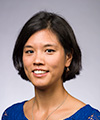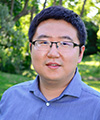New Faculty 2016-2017

Jaime Cardenas
Assistant Professor of Optics
Jaime Cardenas joins the faculty after an appointment as a research scientist at Columbia University. He also worked in the Cornell Nanophotonics Group, beginning in 2007, with research in integrated photonics, silicon photonics, and materials for photonics.
At Rochester, Cardenas will form a research group to focus on next-generation photonic devices integrated on a chip using novel 2-D materials. The group will work on technological problems that prevent integrated photonics from becoming mainstream in consumer applications and enabling integrated photonics to enhance scientific discovery in fields such as astronomy, biomedicine, sensing, and quantum communications.
Cardenas has participated and led workshops at the Cornell Center for Teaching Excellence. His teaching experience includes mentoring of graduate students, instruction of device testing, teaching of microfabrication techniques, a non-calculus physics lab, and quantum mechanics.

Gilbert (Rip) Collins
Professor of Mechanical Engineering
Gilbert (Rip) Collins joins Rochester from Lawrence Livermore National Laboratory, where he was the director of the Center for High Energy Density Physics and a Distinguished Member of the lab’s technical staff.
He leads a multidisciplinary group of scientists, postdoctoral researchers, and students to explore fundamental properties of matter at extreme densities, the microphysics of fusion, and other areas. His work on matter at high-energy density has applications in planetary science, stellar evolution, and controlled fusion. He will lead an increasingly important area at Rochester, exploring the behavior of matter under extreme pressure.
Among many honors, Collins is a fellow of the American Physical Society and has received the APS award for Excellence in Plasma Physics and the U.S. National Nuclear Security Administration Award for Excellence for Stockpile Stewardship Program. He has appeared on television and radio shows (e.g., Discovery Channel; History Channel; National Geographic Channel series, Cosmos) describing extreme matter, planetary science, and fusion science.
He held a visiting professorship at Imperial College and was a visiting scientist at the University of Edinburgh. At Rochester, he holds secondary appointments as a professor of physics and astronomy and a senior scientist at the Laboratory for Laser Energetics.

Edmund Lalor
Associate Professor of Biomedical Engineering and Neuroscience
Edmund Lalor joins the faculty from Trinity College Dublin, Ireland, where he was an assistant professor from 2011 to 2016. Prior to that, he was a postdoctoral research associate at University College London, Trinity College Dublin, and the Nathan Kline Institute for Psychiatric Research.
Lalor’s research interests center on how the human brain selects and encodes information from the many signals we sense in everyday life. Using approaches that combine innovative experimental design with sophisticated signal processing, he has made important contributions to understanding how neural signatures of natural speech processing reflect the encoding of specific speech features and how that processing is affected by attention and visual input. He has also developed novel methods for decoding brain signals for use in brain-computer interfaces and for investigating the specificity of sensory processing deficits in psychiatric and developmental disorders.
Lalor has taught courses on neural signal processing and electronic circuits and design to biomedical and electrical engineers and to neuroscientists. His published work has appeared in journals such as the Journal of Neuroscience, Current Biology, and Cerebral Cortex. He serves as an associate editor for Frontiers in Human Neuroscience.

Ross Maddox
Assistant Professor of Biomedical Engineering
Ross Maddox joins the Rochester faculty from the University of Washington Institute for Learning and Brain Sciences, where he was a postdoctoral fellow.
Maddox studies the brain’s solutions to the so-called “cocktail party problem,” the remarkable ability of the human brain to adeptly focus on one sound source while tuning out numerous competing others. His research has two main thrusts: to investigate how the visual system interacts with the auditory system to improve selective attention under noisy conditions and to identify and disassociate the neural causes of disabled listening, particularly in people who show no signs of hearing impairment as defined by current audiological testing. His work combines behavioral studies, electroencephalography recordings of neural activity, and novel applications of signal processing techniques.
During his postdoctoral training, Maddox earned the Pathway to Independence Award from the National Institutes of Health and an Emerging Research Grant from the Hearing Health Foundation. He also cofounded and hosted Nerd Nite Seattle, a monthly pub lecture series that features a broad array of talks on scientific and cultural topics. He has published his research in numerous scientific journals, including Current Biology, PLOS Biology, and eLife.

Jessica K. Shang
Assistant Professor of Mechanical Engineering
Jessica Shang joins the University following a one-year postdoctoral appointment in the Department of Pediatrics at the Stanford School of Medicine, where she was a Stanford Cardiovascular Institute Fellow.
Shang’s research focuses on the area of experimental fluid dynamics, particularly biologically inspired fluid dynamics, with applications in the interaction between flexible structures and fluid flows. Her work has applications in cardiovascular biomechanics, locomotion, environmental hydrodynamics, and the general understanding of motion in aquatic environments.
Shang has received awards recognizing her academic achievements and her scholarly work from Princeton University, the National Science Foundation, and the Gates Foundation. She is a reviewer for Physics of Fluids, AIAA Journal, and the Journal of Fluids and Structures and has been involved with teaching engineering classes at Harvard and Princeton, including computer-aided design fluid mechanics and automatic control systems.

Chenliang Xu
Assistant Professor of Computer Science
Chenliang Xu joins the faculty after receiving his PhD from the University of Michigan. His research interests include computer vision, robot perception, and artificial intelligence. His work has focused primarily on the problems in high-level video understanding, such as video segmentation, activity recognition, and vision and language. His dissertation advanced the uses of supervoxel hierarchies as a new type of generic video representation in video analysis. He built the first framework for streaming hierarchical segmentation of arbitrarily long videos with constant memory. He is currently working on a book project on video segmentation.
